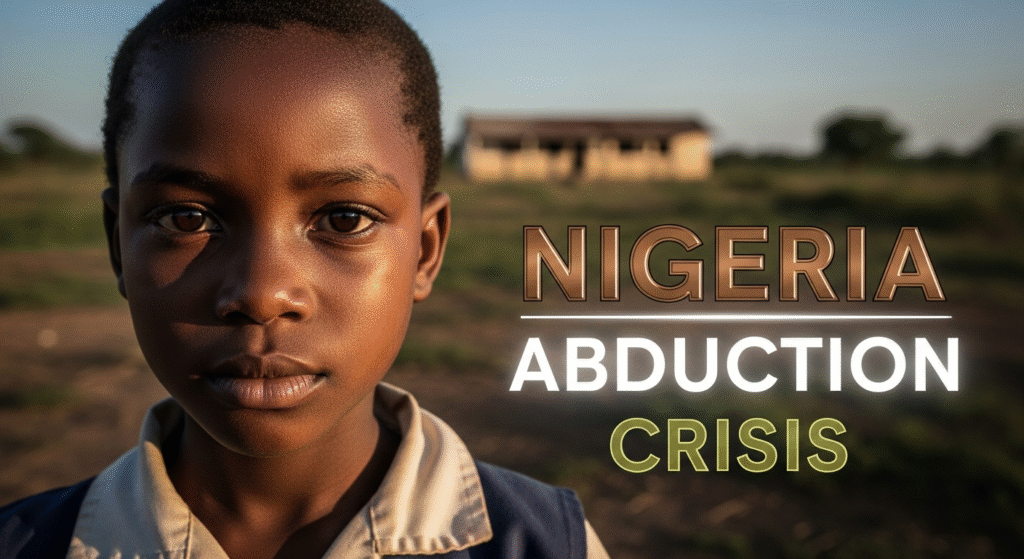

Nigeria School Abduction Crisis: A Long Nightmare
By Darius Spearman (africanelements)
Support African Elements at patreon.com/africanelements and hear recent news in a single playlist. Additionally, you can gain early access to ad-free video content.
A Painful History Behind the Headlines
In the pre-dawn hours of November 17, 2025, gunmen stormed a school in Maga, a community in Nigeria’s Kebbi State (africanews.com). They came with sophisticated weapons, killing a staff member and seizing approximately 25 schoolgirls from their dormitories. This tragic event, reported by the pan-African news channel Africanews, is another heartbreaking chapter in a long story of terror (africanews.com). For many in the African diaspora, this crisis is more than a distant headline. It resonates deeply with our own struggles for safety, justice, and the right to education for Black children. The vulnerability of these Nigerian students echoes the systemic neglect that Black youth often face worldwide, connecting their fight to a global movement for Black lives and dignity (verivafrica.com).
This attack is not an isolated incident. It is part of a decade-long crisis that has crippled the education system in Northern Nigeria. What began as an ideological war has morphed into a brutal, for-profit industry. Therefore, understanding this latest tragedy requires looking back at its roots. The fight for these children’s future is a shared struggle across the diaspora, emphasizing the need for global racial solidarity and the protection of our youth everywhere (verivafrica.com).
The Ideological Roots of Nigeria Abductions
The systematic targeting of Nigerian schools began around 2010. The Islamist militant group Boko Haram was the primary driver (africanews.com). The group’s name translates to “Western education is forbidden,” and its goal was to destroy secular schooling to advance its extremist ideology. This war on education brought Nigeria to the world’s attention on April 14, 2014 (africanews.com). On that day, Boko Haram fighters kidnapped 276 schoolgirls from their school in Chibok, Borno State. The world responded with the #BringBackOurGirls campaign, a movement that drew powerful support from African American activists who saw a parallel fight for the rights of marginalized Black girls (verivafrica.com). As of April 2024, 82 of the Chibok girls are still missing (africanews.com).
Four years later, the horror repeated itself. Boko Haram abducted 110 schoolgirls from Dapchi, Yobe State, on February 19, 2018 (africanews.com). Most were released a month later after the government chose negotiation over a military assault. However, this strategy raised difficult questions. Five girls died in captivity, and one Christian student, Leah Sharibu, was held back for refusing to convert to Islam. This event highlighted a dangerous dilemma for authorities: negotiation might save lives in the short term, but it also risks emboldening kidnappers and funding their future attacks (enactafrica.org).
Victims of Abduction by Region (July 2024 – June 2025)
This chart shows that the Northwest region accounted for the majority of abduction victims in Nigeria during this period (africanews.com).
Banditry in Nigeria: A For-Profit Terror
The threat against Nigerian students has tragically evolved. What started as an ideological insurgency has become a massive, commercially driven criminal enterprise (africanews.com). This new phase is dominated by “bandit” groups, particularly in the northwestern and central parts of the country. Banditry in Nigeria refers to organized crime by armed outlaws focused on kidnapping for ransom, robbery, and extortion (westpoint.edu). Unlike Boko Haram, these groups are motivated primarily by money, not religious doctrine. Widespread poverty, corruption, and a lack of jobs have created an environment where kidnapping seems like a path to “quick money” (africanews.com).
Many of these bandits are former herders, pushed into crime by desperation. Climate change and desertification have destroyed traditional grazing lands, sparking violent conflicts between herders and farming communities over scarce resources (theguardian.com). With little government help, many dispossessed herders have turned to organized crime for survival. Consequently, this transformation from communal conflict to for-profit banditry has plunged huge swaths of rural Nigeria into a state of constant fear. The willingness of families and state governments to pay ransoms has only fueled this multibillion-naira industry (africanews.com).
The Soaring Cost of a Crippled System
The impact of this crisis on Nigeria’s education system is catastrophic. Since the Chibok kidnapping in 2014, armed groups have abducted over 1,680 students (africanews.com). Amnesty International reports at least 17 mass abductions, with over 1,700 children seized from schools (amnesty.org). The financial toll is staggering. Between July 2024 and June 2025, Nigerians paid an estimated N2.56 billion (about $1.66 million) in ransoms (africanews.com). The devaluation of the Nigerian Naira means kidnappers demand even larger sums in local currency to maintain the dollar value of their profits (africanews.com). For example, a ₦1 billion ransom demanded in early 2024 was worth around US$600,000, reflecting an exchange rate of nearly ₦1,700 per dollar (independent.co.uk).
The human cost is even greater. Nigeria already faced an education emergency, with over 18 million children out of school (africanews.com). The insecurity has made things much worse. As of October 2025, at least 188 public schools in Northern Nigeria were shut down (businessday.ng). Earlier data showed that over 11,000 schools were closed between December 2020 and early 2022 because of the constant threat (unicef.org). Furthermore, the violence has decimated the teaching profession. Between 2009 and 2015, about 611 teachers were killed, and another 19,000 were forced to flee their posts (africanews.com).
The Dual Impact of Nigeria’s Abduction Crisis
This chart visualizes the devastating human and infrastructural toll, with thousands of students abducted and even more schools shut down ([SOURCE-1], [SOURCE-31]).
A Nation Gripped by a Security Vacuum
The crisis thrives within a “security vacuum” that plagues Nigeria’s rural regions (africanews.com). This term describes a severe lack of state authority, where police and judicial systems are virtually absent (arabianjbmr.com). This absence allows criminal groups to operate with impunity, creating their own territories where they terrorize local populations. This vacuum is made worse by systemic corruption. Funds meant to equip and pay security forces are often stolen, leaving soldiers and police ill-prepared to confront well-armed bandits (globalinitiative.net). In some cases, corrupt officials even provide intelligence to kidnappers in exchange for bribes, directly enabling their crimes (globalinitiative.net).
This insecurity has shattered the quality of education. Teacher morale has plummeted, leading to high rates of absenteeism as educators fear for their lives (enactafrica.org). This disrupts the school year and leaves millions of children with massive learning gaps. This cycle of fear and disruption robs an entire generation of their future, deepening poverty and making them more vulnerable to recruitment by the very groups that terrorize their communities. Therefore, it is a crisis that feeds itself, creating long-term devastation that will be felt for decades.
An Unstable Response at Home and Abroad
The Nigerian government has launched several initiatives to combat the crisis, such as the “Safe Schools Initiative” aimed at fortifying school buildings (theirworld.org). Military operations have also been deployed to disrupt bandit networks. However, these efforts have had mixed success, as the recent abduction in Kebbi State demonstrates. The persistent violence highlights severe challenges in strategy and implementation. International partners like the United States, the United Kingdom, and France have provided counter-terrorism training and intelligence support (theirworld.org). Yet, the crisis continues to evolve and spread.
The resurgence of attacks in 2024 and 2025 shows a worrying trend. A kidnapping in Kaduna was carried out by Ansaru militants, an Al-Qaeda-linked splinter group of Boko Haram ([SOURCE-1], [SOURCE-18]). Kidnappers have also learned to use religious periods like Ramadan to apply maximum emotional pressure on the government and the public (africanews.com). For the African diaspora, this ongoing struggle is a painful reminder that the fight for freedom and security is global. The children of Nigeria deserve to learn without fear. Unless systemic action is taken to address both the security vacuum and the economic despair that fuels it, this history of violence will keep repeating itself (africanews.com).
The Ransom Economy (July 2024 – June 2025)
Total Demanded
₦48 Billion
Total Paid
₦2.56 Billion
This graphic illustrates the vast scale of ransom demands versus the amounts paid, highlighting the lucrative nature of the kidnapping industry (africanews.com).
About the Author
Darius Spearman is a professor of Black Studies at San Diego City College, where he has been teaching for over 20 years. He is the founder of African Elements, a media platform dedicated to providing educational resources on the history and culture of the African diaspora. Through his work, Spearman aims to empower and educate by bringing historical context to contemporary issues affecting the Black community.
